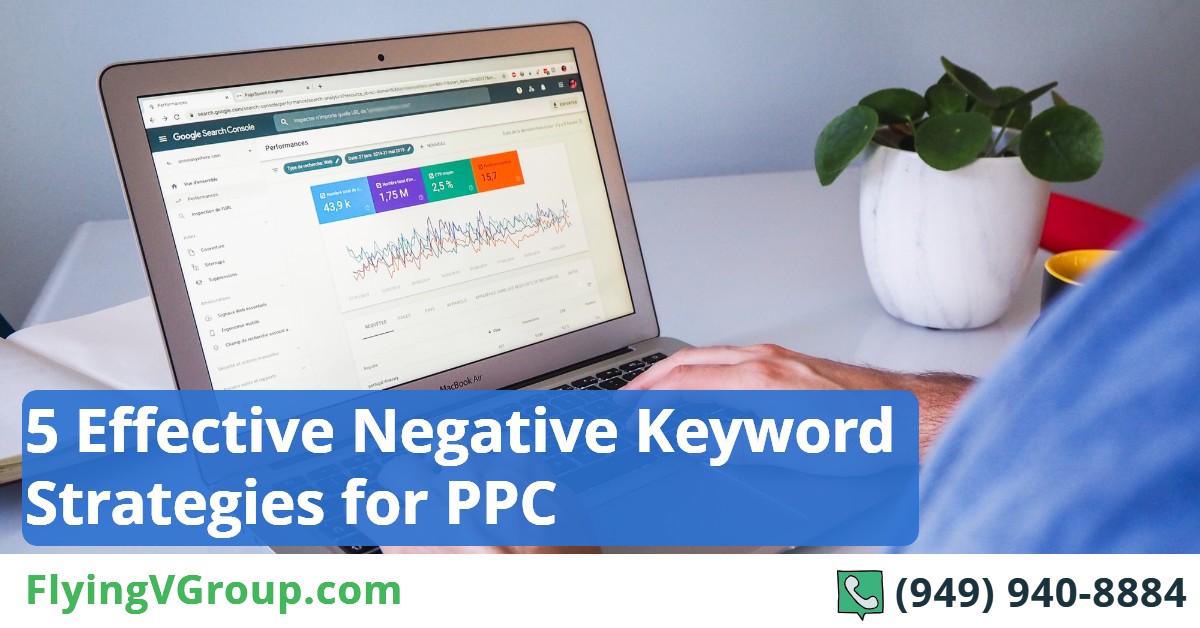Having an effective keyword strategy is an integral part of your overall PPC management. This does not just apply to the keywords that you are actively trying to bid on, but also to your negative keywords.
Your negative keywords will aid in increasing the performance of your ads by saving you money on unwanted clicks and improving your click-through rate with more qualified searches.
In a competitive market, some keywords can significantly increase your conversion cost. The good news is that you can apply negative keywords to your campaign, thus keeping your costs down and your click rates up.
Below are 5 effective negative keyword strategies that will help improve the effectiveness of your PPC campaigns. These negative keyword strategies are great tips for those who are beginners with PPC, and a good refresher for those who have more experience with Google Ads.
What are Negative Keywords?
Before we get started with negative keyword strategies, let’s start with the basics. What are negative keywords and how do they apply to PPC? Negative keywords are the opposite of the typical keywords that you bid on through platforms like Google Ads.
Whereas regular keywords are where you want your ads to show up, negative keywords are where you do not want your ads to appear. These negative keywords let you exclude search terms from your campaigns and help you focus on only the keywords that matter to your customers. Better targeting can put your ad in front of interested users and increase your return on investment.
Now that we know what negative keywords are, let’s take a look at 5 negative keyword strategies for PPC Ads that will help your campaigns perform better.
Run Search Term Reports for Negative Keywords
Search Term Reports are going to be one of the most important, and time-consuming, parts of your negative keyword strategy. The Search Term Report will show you every search term that resulted in an impression, click, or conversion from the best performing, to the non-relevant.
As a plastic surgery marketing agency that manages PPC accounts for plastic surgeons all over the country, we’ve learned that there are many searches related to whether certain celebrities have had specific procedures done, which don’t have any purchase intent.
A search term query report uncovers these sorts of keywords that we can add as negatives.
Say you’re a business that specializes in functional plastic surgery and you are bidding on the broad match keyword of “functional rhinoplasty.” You thought you had already covered your bases by adding negative keywords for the services you do not provide, but someone snuck past your negative keyword by using the search query “cosmetic rhinoplasty”, and your practice does not provide that service. Now you know that there is another keyword that you need to add to your negative keyword list.
That is where the Search Query Report shines. This tactic gives you more insight into the areas that you might have missed when originally making your negative keyword list. Because of this, you’ll want to run the search query report at least once a week if it is a new account. That may sound like a lot of work, and it is, but hard work still works. Accounts that have been running for a longer amount of time can go without this report for a few weeks since you will have already discovered the more common negative keywords by that point.
Negative Keyword Match Types
Keyword match types are an important part of your overall PPC strategy when building out your keyword list and they are just as important for your negative keyword list. Similar to the standard keyword match types, there are three types of negative keyword match types:
- Broad
- Phrase
- Exact
Let’s stick with the example of your functional plastic surgery company. If you add “cosmetic rhinoplasty” as a negative broad match keyword, any query containing both individual terms won’t trigger your ad such as “functional rhinoplasty near me” or “cosmetic surgery near me.”
If you add the keyword as a negative phrase match keyword, it will prevent your ad from showing when a search query contains the whole keyword as an intact phrase. So, your ad would still show for queries where the phrase is broken apart such as “cosmetic and functional rhinoplasty.”
Finally, adding your keyword as a negative exact match keyword will only prevent your ad from showing when someone searches the target keyword and nothing else. A negative exact match wouldn’t prevent your ad from showing for either of the two previous query examples.
Each of these negative match types can have an important role in your negative keyword strategy, and the best match type will depend on what you’re advertising, and what you’re hoping to achieve.
Negative Keyword Lists
Throughout your PPC career, you will come across a series of keywords that you do not want to bid on no matter the campaign.
These are known as “Account Wide Negatives”, and they are important because these common keywords have the potential to drive up your costs while decreasing your CTR. These are the most common categories to add to your Account Wide Negatives list:
- Job-Related
- Research & Stats
- Education/Groups
- Deals
- Price, Quote & DIY
- Computer
- Manufacturers & Industrial
- Materials
- Legal
- Transportation & Travel
- Informational
- Media
- Adult
- Sites
Of course, there may be some cases where an account could benefit from using these kinds of keywords, so be sure to review the account before making this a part of your negative keyword strategy.
Campaign vs Ad Group Negative Keywords
There are two different ways that you can implement your negative keywords. The first is at the campaign level, and that means you won’t ever show any of your ads for these keywords through your entire campaign.
For a functional plastic surgeon, it would be beneficial to have campaign-level negative keywords for different types of medical procedures that your practice does not cover. This will ensure that your entire campaign is not wasting money and driving up CTR on terms that none of your ads should be showing.
Ad group level negative keywords, on the other hand, are used to protect certain ad groups from other ad groups in your campaign. This ensures control over which parts of your campaigns are serving for given terms.
An example of this would be if you are running an account for plastic surgery and have a campaign for rhinoplasty. You can break up your campaign into different ad groups for open, closed, filler, and revision. The problem with this is that since the ad groups are so similar, there is a high chance that the closed rhinoplasty ad group will pick up impressions for closed rhinoplasty. With ad group level negative keywords, you can make sure that your ad groups are not sabotaging each other by stealing their impressions.
Current Events Negative Keywords
There are times when a major event may happen in your field and can negatively affect the performance of your PPC campaigns. That’s why it is important to stay on top of current events to make sure you are not accidentally bidding on queries that will not lead to a qualified click.
This happens often in the plastic surgery industry if a major celebrity gets a new procedure done that you offer as a service. In these kinds of situations, it is important to add these celebrities to your list of negative keywords so you don’t bid on stories about these celebrities.
Additionally, you should have a list of the top 50-100 celebrities that are involved in your industry that does not have to do with your brand. These celebrities will cause much more harm than good to your campaigns which is why this should be a part of your negative keyword strategy.
There are other occasions where there could be a major world event surrounding your industry that could hurt your ads. There could be a scandal with a member of your business, or a new law that could harm a part of your practice. In these situations, you will want to add some of these relevant keywords to your negative keywords list so you are not bidding on search queries that will definitely not lead to a conversion.
Use These Negative Keyword Strategies to Improve Your Ads
Bidding on the best keywords is only half of your overall keyword strategy for PPC. Your success also relies on continuously expanding your list of negative keywords.
Effective negative keyword management keeps your keyword research clean and maximally relevant, so you’re better able to deliver a compelling, targeted message to the exact segment of searchers you most want to reach. Additionally, your budget will be spent on impressions and clicks that are highly likely to drive relevant traffic, qualified leads, and eventual customers.
Utilizing these new negative keyword strategies are just additional tools to add to your arsenal to help your ads perform to their full potential.
Thank you so much for reading 5 Effective Negative Keyword Strategies for PPC. We really appreciate it! If you have any questions about our article, or can suggest any other topics you think we should explore, feel free to let us know.
Be sure to sign-up for our newsletter to receive monthly emails on all of the latest trends and happenings in the digital marketing space. You will also receive our FREE E-Book with the Amazing Marketing Tools for Powerful Business Growth. Sign-up below!
Also, if you received some value out of this article, please share with your friends or colleagues, or leave a comment/question below. We really appreciate you reading our blog and every share/comment means the world to us and allows us to continue producing valuable tools to help you grow your business!






0 Comments